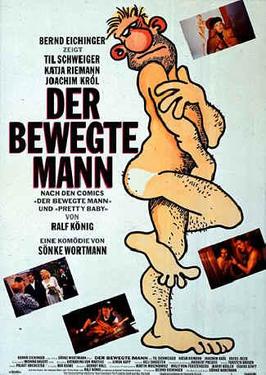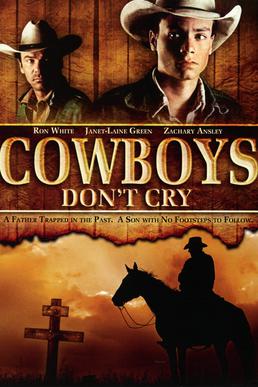
Der bewegte Mann is a 1994 German comedy film directed by Sönke Wortmann and starring Til Schweiger, Rufus Beck, Joachim Król and Katja Riemann.

Jean-Marc Vallée was a Canadian filmmaker, film editor, and screenwriter. After studying film at the Université du Québec à Montréal, Vallée went on to make a number of critically acclaimed short films, including Stéréotypes (1991), Les Fleurs magiques (1995), and Les Mots magiques (1998).

Katja Hannchen Leni Riemann is a German actress.
Zachary Jason Ansley is a Canadian actor. He has been acting professionally since he was eleven years old. He was the winner of the first YTV Acting Award (1989). A graduate of Circle in the Square Acting School, New York City, after graduation he acted with Willow Cabin Theatre, New York, before returning to Vancouver to resume his film and television career.
The Academy of Canadian Cinema and Television presents an annual award for Best Motion Picture to the best Canadian film of the year.
The Academy of Canadian Cinema and Television presents an annual award for Best Performance by an Actor in a Leading Role to the best performance by a lead actor in a Canadian film. The award was first presented in 1968 by the Canadian Film Awards, and was presented annually until 1978 with the exception of 1969, when no eligible feature films were submitted for award consideration, and 1974 due to the cancellation of the awards that year.
The Academy of Canadian Cinema & Television presents an annual award for Best Performance by an Actress in a Leading Role to the best performance by a lead actress in a Canadian film. The award was first presented in 1968 by the Canadian Film Awards, and was presented annually until 1978 with the exception of 1969, when no eligible feature films were submitted for award consideration, and 1974 due to the cancellation of the awards that year.
The Academy of Canadian Cinema and Television presents an annual award for Best Performance by an Actor in a Supporting Role to the best performance by a supporting actor in a Canadian film. The award was first presented in 1970 by the Canadian Film Awards, and was presented annually until 1978 with the exception of 1974 due to the cancellation of the awards that year.
The Academy of Canadian Cinema and Television presents an annual award for Best Performance by an Actress in a Supporting Role to the best performance by a supporting actress in a Canadian film. The award was first presented in 1970 by the Canadian Film Awards, and was presented annually until 1978 with the exception of 1974 due to the cancellation of the awards that year.
The Academy of Canadian Cinema and Television presents an annual award for Best Achievement in Direction to the best work by a director of a Canadian film.
The Academy of Canadian Cinema & Television presents one or more annual awards for the Best Screenplay for a Canadian film. Originally presented in 1968 as part of the Canadian Film Awards, from 1980 until 2012 the award continued as part of the Genie Awards ceremony. As of 2013, it is presented as part of the Canadian Screen Awards.
Patrice Vermette is a Canadian production designer/art director. He is most noted for his work on the films C.R.A.Z.Y., for which he won both the Genie Award for Best Art Direction/Production Design at the 26th Genie Awards and the Jutra Award for Best Art Direction at the 8th Jutra Awards, and Dune, for which he won the Academy Award for Best Production Design at the 94th Academy Awards.
The Canadian Screen Award for Best Costume Design is awarded by the Academy of Canadian Cinema and Television to the best Canadian costume designer. It was formerly called the Genie Award for Best Achievement in Costume Design before the Genies were merged into the Canadian Screen Awards.
Colleen Murphy is a Canadian screenwriter, film director and playwright. She is best known for works including her plays The December Man, which won the Governor General's Award for English-language drama at the 2007 Governor General's Awards, and Beating Heart Cadaver, which was a shortlisted nominee for the same award at the 1999 Governor General's Awards, and the film Termini Station, for which she garnered a Genie Award nomination for Best Original Screenplay at the 11th Genie Awards.
The Academy of Canadian Cinema and Television presents an annual award for Best Feature Length Documentary. First presented in 1968 as part of the Canadian Film Awards, it became part of the Genie Awards in 1980 and the contemporary Canadian Screen Awards in 2013.
The Genie Award for Best Theatrical Short Film was a Canadian film award, historically presented by the Academy of Canadian Cinema and Television through its Genie Awards program to a film judged as the year's best short film. The award has been inclusive of short films in the live action drama, animated and documentary genres.
The Academy of Canadian Cinema and Television's Award for Best Short Documentary is an annual Canadian film award, presented to a film judged to be the year's best short documentary film. Prior to 2012 the award was presented as part of the Genie Awards program; since 2012 it has been presented as part of the expanded Canadian Screen Awards.

Cowboys Don't Cry is a Canadian drama film, directed by Anne Wheeler and released in 1988. The film is based on a novel by Marilyn Halvorson. It stars Ron White, Zachary Ansley, Rebecca Jenkins, Janet-Laine Green and Thomas Hauff. The film received four Genie Award nominations at the 10th Genie Awards in 1989.
Punch is a Canadian dark comedy film, directed by Guy Bennett and released in 2002.
Road to Saddle River is a Canadian comedy film, directed by Francis Damberger and released in 1994. The film stars Paul Jarrett as "The Cowboy Kid", an Eastern European immigrant to Canada who settles in Alberta and undertakes a road trip in search of Saddle River, his idealized vision of the perfect place to establish his desired cowboy lifestyle. His travelling companions are Sam, an unhappy salesman afflicted with ringworm; Dieter, a German tourist; and Norman Manyheads, a young First Nations man who idolizes Elvis Presley.



